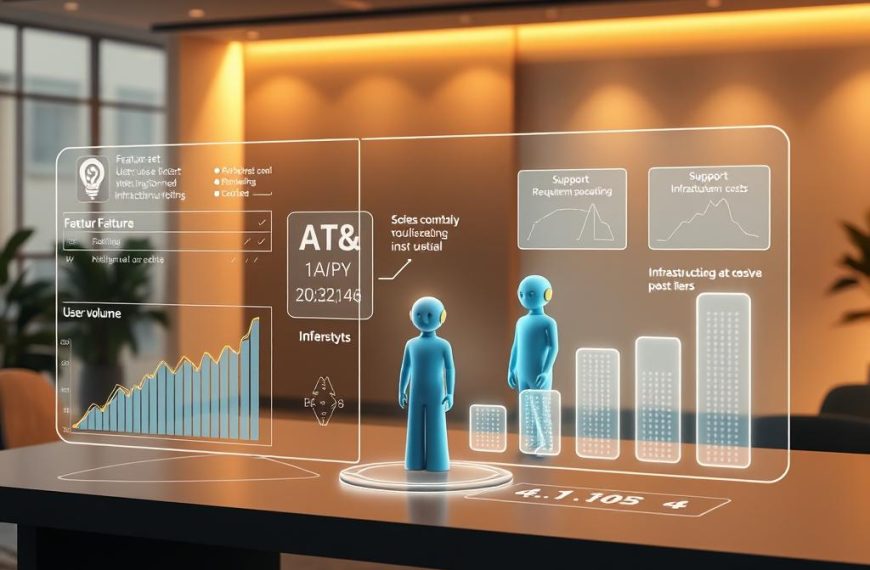AI is quickly becoming a key driver of business innovation and growth. It’s reshaping how companies operate, compete, and deliver value in modern commerce.
Recent data shows a significant shift in business strategies. McKinsey reports 63% of AI-adopting companies saw major revenue increases in 2023.
Gartner predicts AI-integrated businesses will outperform competitors in 2024. They’ll achieve twice the market share and ten times the efficiency.
AI is redefining business potential. Accenture forecasts it will double workforce efficiency by 2035. It’s also expected to boost profitability by 38% on average.
In 2024, AI is set to cut business costs by 37%. It will also manage 85% of customer relationships. These changes signal a smarter business future.
Global economic projections are promising. Experts predict AI will add £15.7 trillion to the world economy in 2024. This marks a new era of tech innovation and growth.
Industries from healthcare to finance are adopting AI-driven solutions. They’re finding new ways to boost productivity and personalise customer experiences. AI is helping businesses make better data-driven decisions.
The future of business isn’t just about new tech. It’s about reimagining what’s possible in the corporate world.
Understanding AI’s Revolutionary Impact on Modern Business
Artificial intelligence is reshaping business landscapes. It’s driving innovation and changing how organisations tackle complex challenges. AI has become crucial for strategic decision-making in modern companies.
AI empowers businesses to unlock unprecedented potential. A whopping 62% of business leaders are investing in AI and automation tools. This shows the growing momentum towards intelligent systems in companies.
Defining Artificial Intelligence in Business Context
Machine learning and deep learning are changing how firms handle information. These AI systems help businesses analyse data quickly and predict market trends accurately. They also automate complex processes and improve customer engagement strategies.
The Evolution from Traditional to AI-Powered Operations
The shift to AI-powered operations marks a significant change in business models. 65% of survey respondents think AI will be as transformative as the industrial revolution. This highlights the massive impact of these technologies on business operations.
Key Components of Business AI Systems
Modern AI systems use advanced algorithms and predictive analytics. They also employ intelligent automation capabilities. These features can save employees an average of 2.5 hours daily.
AI is not just a technology—it’s a strategic imperative for businesses seeking competitive advantage in the digital era.
AI technologies help organisations make data-driven decisions. In fact, 63% of business professionals say AI helps staff better understand customer needs. This shows AI’s growing importance in customer relations.
The Current State of AI Implementation Across Industries
AI adoption is rapidly changing business operations worldwide. In 2024, 65% of organisations regularly use generative AI technologies. This is nearly double the percentage from last year.
AI implementation trends show significant progress. Half of organisations use AI in two or more business functions. Marketing and sales are the main areas for AI applications.
Three-quarters of industry leaders expect AI to cause major changes. Sectors like tech, banking, and pharma are seeing substantial value increases through AI.
- 50% of organisations have adopted AI in two or more business functions
- Marketing and sales remain primary areas for AI applications
- 75% of industry leaders predict significant disruptive changes due to AI
Tech companies could gain value equal to 9% of global industry revenue. Banking and pharmaceutical sectors expect up to 5% value increases.
However, businesses face AI implementation challenges. Data governance, skills integration, and risk management are key concerns. Only 18% of organisations have enterprise-wide AI governance frameworks.
Less than half are effectively managing potential AI-related risks. Still, 67% of respondents plan to increase AI investments over the next three years.
As AI technologies evolve, organisations must navigate adoption complexities. This approach will help them unlock AI’s transformative potential.
How Will Artificial Intelligence Change the Future in Business
Artificial intelligence is transforming the business landscape. AI-driven decision-making is reshaping strategic planning and operational efficiency. As tech capabilities grow, organisations are adapting to this new reality.
Companies are embracing data-driven strategies enabled by advanced AI tech. This adoption is creating unprecedented chances to revolutionise core processes. AI is opening doors to new business opportunities.
Transformation of Decision-Making Processes
AI is changing how businesses make crucial decisions. Business intelligence tools now offer powerful advantages. These tools can analyse huge datasets in milliseconds.
- Analyse vast datasets in milliseconds
- Uncover hidden patterns and insights
- Predict market trends with remarkable accuracy
- Mitigate potential risks proactively
Most executives believe AI will give them a competitive edge. Studies show businesses can increase sales by 20% through advanced data analysis.
Enhanced Customer Experience and Personalisation
AI tech is transforming customer interactions through smart personalisation. Chatbots and recommendation systems are leading this change. These systems can provide instant, tailored customer support.
- Provide instant, tailored customer support
- Generate personalised product recommendations
- Predict customer preferences with 95% accuracy
Automation and Workforce Evolution
AI integration is reshaping workforce dynamics. Organisations are seeing major operational improvements. AI systems can save up to 30% in costs by automating repetitive tasks.
AI is not about replacing humans, but empowering them to focus on more strategic, creative endeavours.
By 2025, AI is set to handle 85% of customer interactions. This shift highlights the profound changes in business operations. It also shows how companies will engage with stakeholders in the future.
AI-Driven Business Intelligence and Data Analytics
AI analytics is transforming business intelligence, revolutionising how organisations handle complex data. Companies are uncovering new insights through advanced big data processing. This enables them to detect patterns that were once invisible.
Predictive modelling has become a game-changer for businesses seeking an edge. AI technologies empower organisations in various ways.
- Automate complex data analysis processes
- Generate rapid, accurate insights
- Reduce human error in decision-making
- Explore intricate data patterns
AI-powered tools are reshaping data interpretation strategies. Natural Language Processing allows non-technical staff to query data using everyday language. This democratises analytical capabilities across organisations.
Advanced AI systems can process structured and unstructured data, offering quick analytical insights. Companies using these technologies can swiftly respond to market shifts. They can also monitor real-time data and make better strategic choices.
AI is not replacing human intelligence but augmenting our analytical capabilities, creating a collaborative future in business intelligence.
Firms embracing AI analytics are leading innovation in their fields. They’re turning raw data into actionable intelligence. This drives meaningful business growth and keeps them ahead of the competition.
Innovation and Competitive Advantage Through AI
AI is transforming how businesses approach innovation, strategy, and competitive positioning. It’s become a crucial tool for navigating complex markets with unmatched precision. AI forecasting offers unprecedented insight for organisations seeking a competitive edge.
AI’s power in business goes beyond traditional analysis methods. Companies can revolutionise their strategic approach using advanced market prediction techniques. This shift allows them to gain significant competitive advantages in their industries.
Predictive Analytics and Market Forecasting
AI-powered predictive analytics are reshaping business intelligence with remarkable capabilities:
- Analyse massive data volumes with exceptional accuracy
- Identify emerging market trends before competitors
- Generate actionable insights beyond human analytical capacity
“AI enables businesses to move from reactive to proactive decision-making” – Technology Innovation Research Institute
Strategic Planning and Risk Management
Business foresight through AI introduces transformative risk management strategies:
- Cybersecurity threat detection reduced by 50%
- Operational efficiency increased by 20-30%
- Human error minimised by up to 70%
Product Development and Innovation
AI fuels innovation by offering deep customer insights and speeding up development processes. Social media listening tools powered by AI can analyse millions of digital messages.
These tools uncover nuanced consumer preferences and emerging market opportunities. They provide valuable data for product development and marketing strategies.
55 percent of organisations have already adopted AI technologies. This trend shows that the future of business innovation is algorithmic, data-driven, and incredibly intelligent.
Challenges and Considerations in AI Business Integration
Businesses face numerous AI implementation challenges that require strategic thinking. Integrating AI technologies involves complex considerations across technological, ethical, and operational areas.
Data privacy is a critical concern in AI adoption. Organisations must create strong frameworks to protect sensitive information whilst using AI’s transformative power.
- Addressing algorithmic bias in decision-making processes
- Ensuring transparent and explainable AI systems
- Maintaining rigorous data protection standards
- Managing potential workforce disruptions
Ethical AI needs strategies that balance innovation with responsible implementation. Companies must invest in thorough training programmes to promote fairness.
Developing governance mechanisms that ensure accountability is crucial. This approach helps maintain trust and integrity in AI systems.
| Challenge | Impact | Mitigation Strategy |
|---|---|---|
| Data Privacy | Potential legal and reputational risks | Implement strict encryption protocols |
| Algorithmic Bias | Unfair decision-making | Diverse dataset development |
| Skill Gap | Limited AI integration capabilities | Continuous professional development |
Successful AI integration demands a holistic approach that transcends technological implementation and embraces comprehensive organisational transformation.
Conclusion
AI technologies are rapidly changing business innovation. A whopping 77% of companies are exploring or using AI solutions. This shift marks a technological revolution in how organisations operate and create value.
Business leaders see the vast potential of AI-driven strategies. The global AI market is set to grow at 38.1% annually. This growth offers huge opportunities for companies willing to adapt.
AI enhances customer experiences and streamlines complex processes. It’s a crucial tool for staying competitive in our digital marketplace.
Integrating AI requires balancing tech capabilities with human creativity. AI can process data 18 times faster and may create new jobs. However, it needs careful implementation.
Successful organisations will view AI as a powerful collaborative tool. It amplifies human potential and drives unprecedented innovation. AI doesn’t replace human talent; it enhances it.
The AI journey in business is just starting. An impressive 83% of companies prioritise AI. Moreover, 80% of business leaders believe it gives them an edge.
The message is clear: embracing AI is essential for future success. Thriving businesses will be those ready to learn and harness AI’s transformative power.
















